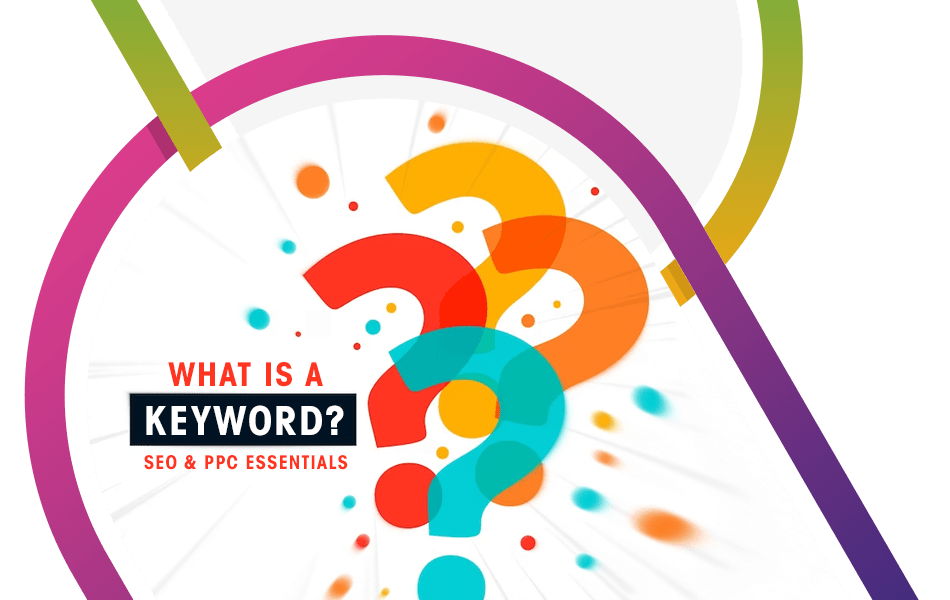
Free SEO & PPC Review
Our team will manually review your website and ad campaigns, then provide you with a personalised report showing exactly how to improve.
Keywords are pivotal for Search Engine Optimisation (SEO) and Paid Per Click (PPC) campaigns, but what is a keyword, and why does it hold such significance? A keyword is a word or phrase that encapsulates the core theme or subject of a web page’s content.
However, in the realms of SEO and PPC advertising, keywords are more than just terms; they are the vital links that connect user queries to relevant online content. They serve as navigational beacons guiding users to the information, products, or services they are looking for online.
In this blog post we will dive into the world of keywords to:
- Explore their history
- The evolution from simple terms to complex phrases
- their pivotal role in shaping online marketing strategies.
Keywords Are Not Static
Keywords are dynamic and responsive to three fundamental yet evolving and changing needs:
- Internet usage
- Search engine algorithms
- User behaviour
They are the language of the internet user, constantly evolving to match the ever-changing lexicon of everyday conversation. In this post, we will uncover how keywords have grown from basic indicators to sophisticated user intent and interest markers, reflecting how people interact with search engines today. Furthermore, we will explore how digital marketing agencies like Link Digital use keywords to optimise websites, craft compelling content, and create effective advertising campaigns.
Understanding keywords is crucial for anyone looking to make an impact online. Whether you are a business owner, a marketer, or simply someone curious about the mechanics of search engines, this exploration into the world of keywords will provide valuable insights and practical knowledge.
With Link’s extensive experience in SEO and PPC, this blog will not only define what keywords are but also illustrate their strategic importance in connecting businesses with their target audiences.
The Evolution of Keywords
To truly grasp “what is a keyword” in the context of modern digital marketing, it’s essential to recognise its evolution.
Initially, keywords were primarily single words that users would input into search engines. These single words were the early seeds from which the SEO and PPC grew. For instance, a user might have searched for “Red Shoe” in the early days of search engines.
As the internet expanded and user sophistication increased, the nature of search queries evolved. Users began to search in phrases and questions, mirroring natural language more closely. This shift led to the rise of long-tail keywords – phrases that are more specific and often more aligned with the user’s intent.
Continuing with our example, instead of searching for “Red Shoe,” a user might now search for “Red Open Toed High Heel Ladies Shoe.” This longer phrase is much more specific and indicates a clearer search intent, which allows marketers and businesses to tailor their SEO and PPC strategies more effectively.
This evolution from single words to phrases has been a game-changer in digital marketing. It has allowed for more targeted and relevant content, aligning closely with user needs and search contexts.
For businesses and marketers, understanding this shift is crucial. It’s not just about identifying the right keywords but understanding their intent. This understanding is at the heart of what Link Digital does – leveraging the power of keywords to connect businesses with their ideal audience in the most effective way.
As we continue this article, we’ll delve deeper into the historical progression of keywords, exploring how this evolution has shaped online marketing strategies and how businesses connect with their audiences.
Types of Keywords in SEO and PPC
To progress in answering the question “What is a keyword?” a critical step is to understand the types of keywords and how they can effectively impact SEO and PPC strategies. Link leverages these keywords to optimise online presence and connect with target audiences.
Exact Match Keywords
Exact match keywords are the cornerstone of precision in digital marketing. They are used to target users who are searching for a specific phrase. This is particularly vital for PPC and ensuring that the content or ads displayed are highly relevant and is a strategy used to generate and improve higher conversion rates.
High Relevance: Exact Keywords trigger ads or content for exact search queries. For example, if Link Digital sets up a PPC campaign using the exact match keyword “SEO Consultancy Services,” our ad will only appear when this exact phrase is searched. This precision ensures that the audience seeing the ad is specifically looking for SEO consultancy services, making them more likely to engage.
Targeted Traffic: Leads to more qualified leads and potential conversions. By using exact match keywords, businesses can significantly reduce irrelevant traffic and focus on users with a clear intent to engage or purchase. This targeted approach is more cost-effective and yields better ROI.
Link Digital’s Strategy: Utilised in PPC campaigns for precise audience targeting. Link Digital leverages exact match keywords to create highly targeted ad campaigns for their clients. This strategy ensures that their clients’ advertising budgets are spent on reaching the most relevant and interested audience, thereby maximising the effectiveness of their PPC campaigns.
Exact match keywords are a powerful tool in the arsenal of digital marketing, especially when precision and relevance are paramount. By carefully selecting and implementing these keywords, businesses can significantly enhance the effectiveness of their online advertising efforts.
Phrase Match Keywords
Phrase match keywords strike an important balance in digital marketing, offering both reach and specificity. This type of keyword targeting is particularly useful for capturing a range of user queries that “include” the chosen phrase, potentially with additional words before or after it.
Flexible Reach: Phrase match keywords appear for searches that include the specified phrase, potentially with other words in the query.
For instance, if Link Digital uses “Digital Marketing” as a phrase match keyword in their PPC campaigns, their ads could appear for searches like “Affordable Digital Marketing Services” or “Digital Marketing Companies.” This flexibility allows them to reach users looking for something specific within the realm of digital marketing but might phrase their queries differently.
Broader Audience: By using phrase match keywords, businesses can capture a wider audience than with exact match keywords without sacrificing too much relevance. This approach is particularly effective for reaching users at different stages of the buying process or with varying levels of awareness about a product or service.
Application in Google Ads: Phrase match keywords are a key strategy in Link Digital’s PPC campaigns. They allow Link Digital to tailor their clients’ ads to appear in a range of relevant search queries, increasing the chances of reaching potential customers who are interested in the services offered but might not use the exact terminology.
Phrase match keywords are an essential tool for businesses looking to optimise their reach while maintaining a level of specificity in their digital marketing campaigns. They provide the flexibility needed to adapt to the diverse ways users search for products and services online, making them a valuable component of any PPC strategy, especially in the hands of experts like Link Digital.
Broad Match Keywords
Broad match keywords are the most expansive type of keyword targeting used in digital marketing. They are designed to maximize visibility and reach by being less specific yet capable of attracting a diverse range of traffic.
This approach is particularly useful for broad-market targeting and businesses seeking to increase brand awareness.
Widest Reach: Broad match keywords show content or ads for searches that include any words in the key phrase, in any order, and possibly along with other terms. For example, if Link Digital uses “Web Design” as a broad match keyword, their ads might appear for a wide array of searches like “Affordable Web Design Services,” “Web Design Courses,” or even “Web Design Tools.” This wide net ensures that the content reaches a broad audience, capturing various interests related to the core topic.
Diverse Traffic: Using broad match keywords effectively attracts a wide range of search queries, making it ideal for businesses looking to explore new market segments or to understand different user interests related to their field. This diversity can provide valuable insights into market trends and customer behaviour.
Strategic Use by Link Digital: Link Digital employs broad match keywords strategically for maximum exposure and to engage with a broader audience at the initial stages of marketing campaigns. This approach is particularly effective in building brand awareness and reaching potential customers who might not be aware of the specific services offered but are interested in the general field.
Broad match keywords are a powerful tool in digital marketing, especially when the goal is to expand reach and explore new market opportunities. While they may bring in a more varied audience, with the expertise of a digital marketing agency like Link Digital, they can be used effectively to build brand presence and lay the groundwork for more targeted marketing efforts.
Long Tail Keywords
Long-tail keywords are highly specific phrases in digital marketing, often encompassing three or more words.
They are less competitive than shorter keywords and are excellent for targeting niche markets and specific user needs. These keywords are particularly effective due to their close alignment with user intent.
High Specificity: Long-tail keywords target detailed and specific user queries, making them highly relevant to a particular audience.
For instance, instead of a broad term like “shoes,” a long-tail keyword would be “women’s waterproof hiking shoes size 7.” This level of detail ensures that the content or ads reach users searching for very specific items, leading to higher engagement and conversion rates.
Niche Targeting: These keywords are ideal for reaching specific demographics or interests. They allow businesses to tailor their content or ads to a particular market segment, which is especially useful for companies with unique or specialised products or services.
Integral in SEO/PPC: Long-tail keywords are crucial to both SEO and PPC strategies.
SEO helps content rank higher in search results for specific queries, while PPC can reduce costs per click due to lower competition.
Link Digital expertly utilises long-tail keywords in their campaigns to achieve targeted results. Focusing on these specific phrases can create highly effective campaigns that resonate with the intended audience.
Long-tail keywords are invaluable for businesses looking to connect with a specific audience in digital marketing. Their specificity and alignment with user intent make them powerful tools for driving targeted traffic and increasing conversions. With the strategic use of long-tail keywords, Link Digital helps its clients effectively reach and engage with their niche markets, ensuring that their marketing efforts are efficient and effective.
Introduction to Keyword Research
Keyword research is a critical and strategic component in the realms of SEO and PPC. It’s the process of identifying and analysing the terms and phrases that are most relevant and valuable to a target audience.
This research is foundational in crafting digital marketing strategies that resonate with potential customers.
Business Insights: The first step in keyword research involves:
- A deep understanding of the business
- It’s unique offerings.
- The target market.
For example, if Link were working with a boutique hotel, we would start by understanding:
- The hotel’s unique features
- Target clientele
- Market position.
This understanding forms the basis for identifying relevant keywords.
Research Tools: Utilising advanced industry standard tools like Google Keyword Planner and SEMrush enables data-driven insights.
These tools help in identifying:
- Keyword trends
- Search volumes
- Competition levels.
Using the boutique hotel example, tools might reveal high search volumes for terms like “luxury boutique hotel in [City]” or “exclusive hotel experiences.”
User Intent Analysis: Keywords are categorised based on the searcher’s intent and stage in the buying process.
This could range from informational queries like “best hotels for a weekend getaway” to transactional searches such as “book boutique hotel in [City].” Understanding search intents enables digital marketers to tailor content and ads to match these intents.
Dynamic Approach: The digital landscape and keyword trends are ever-changing. Regular updates and adaptations are essential to stay current with market trends. Digital marketers’ role is to continuously monitor and adjust their keyword strategies to align with evolving search patterns and market dynamics.
Link Digital’s Comprehensive Approach: Link Digital’s approach to keyword research is thorough and tailored. Combining industry knowledge with SEO and PPC expertise ensures our client’s digital strategies are effective and highly relevant. This approach helps in:
- Connecting businesses with their ideal audience
- Leveraging the right keywords to attract and engage potential customers.
Through strategic keyword research, Link Digital empowers businesses to understand and effectively reach their target audience. This process is integral to developing SEO and PPC strategies that deliver results, ensuring that clients appear in search results and connect meaningfully with their customers.
Implementing Keywords in On-Page SEO
Once the target keywords are identified, the crucial next step is their effective implementation in on-page SEO.
This process involves strategically incorporating these keywords into various elements of your website. The goal is to optimise your site for search engines and users, enhancing visibility and user experience.
Title Tags and Meta Descriptions: These are critical elements where keywords must be included. Title tags define the title of a webpage and are a major factor in search engine rankings. Meta descriptions provide a summary of the page’s content.
For instance, if a target keyword is “organic coffee beans,” the title tag could be “Premium Organic Coffee Beans – Fresh & Aromatic” and the meta description might read, “Explore our selection of the best organic coffee beans, handpicked for freshness and aroma. Perfect for coffee connoisseurs.” (tester…what type of keyword is used in our example here?)
Headings and Subheadings: Using keywords in headings (H1, H2, H3, etc.) helps structure your content and makes it easier for search engines to understand the main topics of your page. For example, a blog post about digital marketing trends might have headings like “2023 Digital Marketing Trends” or “Emerging SEO Strategies.”
Content Optimisation: Keywords should be naturally integrated into the website’s content, including blog posts, product descriptions, and informational pages. Maintaining a natural flow is crucial – keyword stuffing is penalised by search engines. The content should provide value to the reader while subtly incorporating the keywords.
URL Structure: Including keywords in the URL can also enhance SEO. URLs should be simple, readable, and include the primary keyword for the page. For example, a URL like www.linkdigital.co.uk/services/seo is both user-friendly and effective for SEO.
Image Alt Text: Images offer another opportunity to optimise with keywords. The alt text of images should describe the image and, where relevant, include a keyword. This not only helps with SEO but also improves accessibility.
Internal Linking: Using keywords as anchor texts for internal links can help strengthen the SEO of other pages on your site. For example, a link to a page about web design services might be anchored with the text “professional web design services.”
Implementing keywords in on-page SEO is a process that requires a balance between optimisation for search engines and providing a seamless user experience. By optimising websites to be visible to search engines yet also appealing and informative to users is a best practice approach which leads to:
- Improved search rankings
- Higher user engagement
Better conversion rates.
Conclusion
So, hopefully, now you have a full understanding of “What is a Keyword?” but to conclude, as search engines and user behaviour continue to evolve, so must our approach to keyword research and its usage.
Key takeaways:
- Keywords are the backbone of digital marketing, bridging the gap between user queries and relevant online content.
- Understanding keywords is pivotal for any successful SEO or PPC campaign.
At Link, our staff run our successful campaigns by staying informed and adaptable to industry changes to ensure that our client’s content not only ranks well but also genuinely meets the needs of their audience. Embracing the complexities of keywords is not just about improving visibility; it’s about connecting with and serving the audience more effectively.
For expert assistance in navigating the world of keywords, contact Link, where our expert team is ready to help elevate your digital marketing strategy.

Need help with your website and marketing?
Book a FREE growth strategy session with our experts
Our award-winning team will review your website and marketing goals to provide you with crucial insight and advice.

4.9 STAR
Google reviews
With 10+ years of experience, Link Digital has helped hundreds of businesses to succeed online. We can help yours too!

